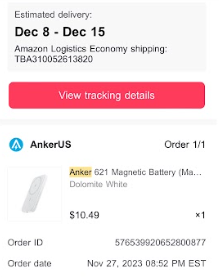
Stanley cups to Owalla water bottles. Summer Fridays Butter Balms to the Rhodes Peptide Lip Tint. Depending on the Internet’s weekly whims, must-buy products seem to fluctuate immeasurably. Recently, TikTok, the social media hub for these rapidly changing product trends, has plunged headfirst into the e-commerce landscape with its introduction of TikTok Shop, a platform where one can buy anything from name-brand makeup products to niche kitchen gadgetry without even swiping out of the app.
“I think TikTok Shop is super convenient because content creators can link the products they are using right on the video,” WCHS senior Eric Bomfim said. “It cuts out a lot of the communication and extra steps required to hunt down something that you saw and wanted from someone’s video.”
TikTok Shop’s format and incentive system closely resemble that of another online shopping platform, Temu, a site many recently became aware of with its catchy (and incessant) Super Bowl jingle. Temu’s free bundles and deals seem too good to be true, as they are presented like minigames in spinner wheel form every time one logs on. Deals often promise that one will receive items for free if they can choose a certain amount under a time limit. This strategy of seemingly unbelievable, frequent deals presented in an exciting way is paralleled by TikTok Shop.
“I feel like TikTok Shop gives me really broad access to many different kinds of products in one space, which makes it really accessible and affordable,” WCHS senior Ana Grazziani Barrios said.
Convenient as it may be, many question the ethics of the platform’s introduction of this in-app shopping site. No matter the number of followers, when one makes a video promoting a product and connects its TikTok shop link, they can profit from the number of users who purchase the product using that link provided as part of the TikTok Creator Marketplace initiative.
“On each video, TikTok informs viewers about whether or not a link is ‘eligible for commission,’ but it is sometimes still hard to discern whether someone is raving about a product for profit, or because it’s actually worthwhile,” Bomfim said.
In addition, with TikTok Shop, the app now joins the array of online shopping sites that enable and perpetuate consumerism. With recent trend culture, an added emphasis on materialism has been normalized. Labeling oneself with the latest buzzword can only be completed with the perfect hairstyle, lip gloss or piece of clothing.
“Since so many trends develop on TikTok, having the in-app shop makes it a lot easier to keep up with trends,” Barrios said. “I find myself adding things I don’t even need into my cart and consuming in excess.”
Convenient as it may be, TikTok Shop raises many questions about the changing landscape of e-commerce. The easy access to become a buyer or a seller on the app is a cause for concern because of the lack of transparency. It has never been easier to buy a scam or low-quality products from misleading advertising on the Internet. For teens especially, vigilance about digital literacy and Internet safety is vital as the Internet continues to develop.
“I was really skeptical of TikTok shop when I first used it, and it was lucky that I avoided getting scammed,” Graziani-Barrios said.
With its wide array of products from both big and small sellers, TikTok shop is an asset for teenagers trying to keep up with trends and find good deals. When used in a mindful, smart way, it can be a great resource for teens and other TikTok users.
“I think platforms like TikTok Shop represent how far the Internet has progressed in terms of making things accessible and affordable,” Bomfim said. “But it is still important to stay aware and think critically about where your money is going.”








